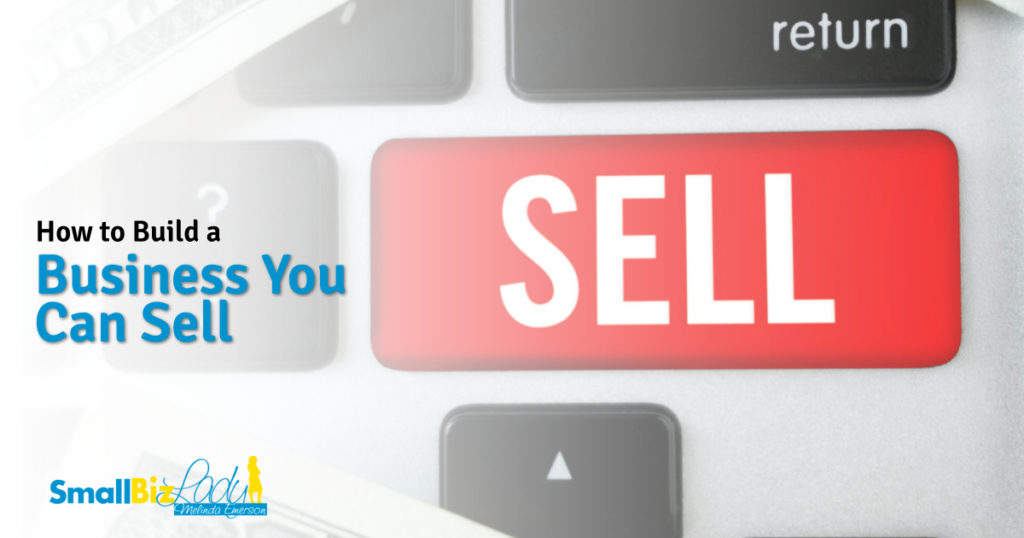How to Build a Business You Can Sell

 Starting a new business is exciting! And while most people focus in on the immediate needs of starting a business, one thing all business owners should think about is how to build a business they can sell. Let’s look at four essential steps to ensuring your business could be sold, should you choose.
Starting a new business is exciting! And while most people focus in on the immediate needs of starting a business, one thing all business owners should think about is how to build a business they can sell. Let’s look at four essential steps to ensuring your business could be sold, should you choose.
Create the Business with the Big Picture in Mind
Building a business from the ground up requires trial and error to lay the foundation necessary for the business to grow. However, it is also important for entrepreneurs to be mindful of the long-term, big picture goal. Do you want your business to expand, be acquired by a larger company, or sell it off to someone else afterward? If so, the foundation of starting a business should also include the necessary elements for a business to have resale value.
Keep Track of your Financials
When your business starts to generate profit, you should keep track of all the financials. We recommend using accounting software like QuickBooks so you can have a clear and organized record to share with future buyers. When you are ready to sell your business, you need to go through the business valuation process. Business valuation processes generally begin with gathering the business’s previous three years of financial statements, which include balance sheets, cash statements, and income statements.

Clear and organized financial statements are not only beneficial for selling your business in the future, but it will also help you as a business owner track and measure how you will continue to grow your business. Furthermore, whoever will continue to run the business afterward will be able to decide how they can best manage it going forward.
Make a Smooth Transition Process
Starting a business will require experimenting and beta-testing until you find the best systems and processes for your business model. Future buyers of a business want to be comfortable owning and operating a company they are not familiar with, so it is recommended that at least two weeks of support and training is required. Similar to keeping track of your financials, it is also beneficial to keep track of the specific procedures that worked best for your business. Perhaps creating a manual while you continue to build your business.
Business owners who decide to sell their business must decide how they would want to transition their business to someone new. Some important factors to consider when creating your processes include:
- Would you want to exit completely from the company?
- Does a partial involvement such as a consultant seem an attractive option for you?
- Are there certain individuals that you do not want to sell to?
- Is the future of the business concerning for you?

The ease of transition into the new business is an important part of a potential buyer’s decision. It would be ideally better to invest in a business that has a much easier transition and the least disruptions to business flow when the company changes hands. The best way to show make your business transferrable is by having a proven track record, established policy, detailed records, and renewable contracts. If the commercial entity offers a good transition package, it will be more attractive.
Support from a Business Broker

When you are ready to sell your business, it is better to work with a business broker who has experience in selling businesses and finding qualified leads. The business broker will be able to focus on the sale, while you as the business owner can focus on adding more value to the actual business by making sales and generating revenue A business broker is also a great resource to deal with conflict resolution because they are experienced in making the business sale process as seamless and painless as possible for both parties. Business brokers are typically compensated once the sale is complete so they are strongly incentivized to see it through. A strong pre-sale plan will not only help get through the sale but provides support to the business in achieving the best sales price.
Starting your own business is an exciting adventure to become your own boss and create something new and valuable to your community. With it also comes the responsibility on all factors from building it up, operations, and deciding in the long term how to proceed in selling it.
 About the Author: Elizabeth Tran is the Business Development Associate of Vetted Biz. Vetted Biz provides accessible and analytical data on U.S. businesses and franchises for people to learn, buy, and sell.
About the Author: Elizabeth Tran is the Business Development Associate of Vetted Biz. Vetted Biz provides accessible and analytical data on U.S. businesses and franchises for people to learn, buy, and sell.
Read More
Source

No comments